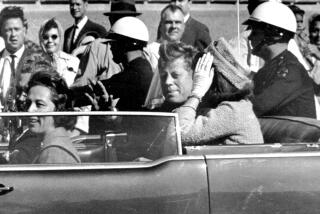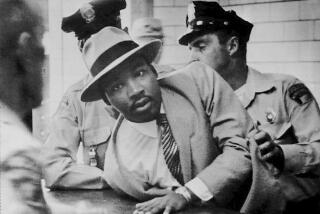Southern Discomfort : TNT EXPLORES THE MYTH OF THE ‘KINGFISH,’ THE MAN BEHIND LOUISIANA’S DEPRESSION-ERA POLITICAL MACHINE
- Share via
NEW ORLEANS — On a steamy summer day ceiling fans spin lazily in a New Orleans church hall, remade into the Louisiana Senate for “Kingfish: A Story of Huey P. Long,” which premieres Sunday on TNT.
The year is 1929. Broad-brimmed hats rest next to Coca-Cola bottles, ashtrays and the occasional whiskey canister. Fifty white men of advancing years, seated behind desks, sporting wide-lapel coats and short ties, await the next witness in impeachment proceedings against Gov. Huey P. Long.
John Goodman is Long, the self-proclaimed Kingfish who marched in parades slashing the air with an invisible baton, dazzled the poor with electrifying speeches and built the most ruthless political machine in modern American history.
With the bayou state savaged by the Depression, the governor clashed with big law firms and patrician politicians over an oil tax to fund ambitious public works programs. He got it.
A far cry from the easygoing Dan Conner who buoys “Roseanne,” Goodman fills out the cream-colored pants and matching vest like a titan on the make. The nimble body language of the summer’s Fred Flintstone, patterned after Jackie Gleason, has given way to a tough swagger, equal parts sinister and comic.
Goodman, 42, is the exact age Long was when he was murdered.
Later Goodman will say that for him, only one character is reminiscent of Huey Long--Shakespeare’s Macbeth.
Long defused the impeachment and he went on to the U.S. Senate, ruling Louisiana through a puppet governor, greasing the way for New York mobsters to set up gambling operations down home.
His murder is shrouded in enigma. A young doctor, Carl Weiss, who was fatally shot at he same time in the capitol at Baton Rouge was blamed. Some speculate that Weiss was a fall guy and Long was killed by a guard in an inside job.
The script by Paul Monash, who won an Emmy for “Stalin,” leaves the murderer’s identity unclear and generally tracks the Pulitzer Prize-winning biography, “Huey Long,” by the late T. Harry Williams.
After “The Kingfish” wraps, Goodman stays on in New Orleans, where he and his wife Annabeth met, to visit in-laws. “If we wanted to do a true story it would have been a miniseries of about two weeks,” he reflects one afternoon at House of Blues, “and that would just scratch the surface.”
Goodman grew up in a blue-collar suburb of St. Louis. Did he identify with Long?
“There’s a part of me that could. Huey exaggerated his poverty a great deal because it made good copy ... But remembering what my mom went through, trying to raise two kids on a salesgirl’s salary--you could sure buy into a lot of what he was saying.” He pauses. “I’ll never get my finger on the guy. I have our slant. His heart was good, but absolute power corrupts.
“I tried to use the script as a guideline and see how far I could push things and let the director (Tom Schlamme) pull me back if he thought I was going too far,” continues the actor who also portrayed “The Babe.”
“This guy was, like Babe Ruth, larger than life,” he says. “I mean just outrageous.”
How does Goodman see Long historically? “He’s not a villain or a clown--he’s a force,” says the actor. “I view him as a product of the times.”
Researching the role gave Goodman a sense of Long’s mystery. “Huey came along with a bloody lip after he was shot and said, ‘Who hit me?’ What does that mean? There are people who would bet their lives that Carl Weiss didn’t kill him...I love this state. I’m a kind of adopted son and the Kingfish is almost mythological down here, a Zeus. I wanted to do it with as much respect as I could and also without shading it, to get down and dirty with him but not run his name into the ground.”
Goodman credits John McConnell, with whom he became fast friends, for helping him get “under the skin of the character.” In the late ‘80s McConnell took “The Kingfish,” a one-man play by Larry L. King and Ben Z. Grant from small theaters in bayou country to a long run in New Orleans, and 75 off-Broadway performances. Here, he plays Bozeman, a hulky bodyguard and confidante of the governor.
Moving the cast like a political campaign, director Schlamme used 58 locations in a 200-mile area, finishing in 29 days.
Production designer Tom Walsh and his wife, Marilee, the costume coordinator, create a canvas of authentic auras surrounding Long in backrooms and on the hustings. Today it’s a parade through the town of Covington.
As the movie rolls into town, moist magnolias shed lemon-sweet scents. Baton-twirling girls with fringe on their skirts have come from a nearby school to mingle with locals. Old men wear older hats, their woman in ankle-length dresses. Huey shambles through, shaking hands two at a time, with Bozeman hulking behind him like an orangutan.
A reporter follows the governor, hungry for a quote.
“I ain’t prejudiced,” booms Goodman. “I’ll talk to anybody.”
Why is it, the reporter asks, that some of the 1,500 miles of roads and bridges he has built “seem to stop in the middle of nowhere?”
The big man doesn’t miss a beat. “The middle of nowhere, son, is the geographic destination where people stop cooperating with the Kingfish.”
“Kingfish: A Story of Huey P. Long” airs Sunday at 5, 7 and 9 p.m. on TNT; it repeats Wednesday at 6 p.m. , Friday at 5 p.m.
More to Read
Only good movies
Get the Indie Focus newsletter, Mark Olsen's weekly guide to the world of cinema.
You may occasionally receive promotional content from the Los Angeles Times.









